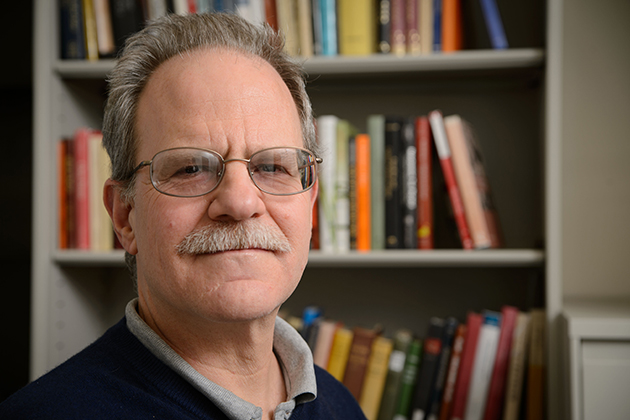
The expanding Asian and Asian American Studies program at UConn welcomed prominent modern China scholar Peter Zarrow to campus this year. Zarrow’s work examines the major cultural and political shift before and after the fall of the Chinese monarchy at the turn of the 20th century, after more than 2,000 years of imperial rule.
“It was a critical period in history,” Zarrow says. “The monarchy was crumbling. There was a growing acquaintance with Western ideas. It was a time when progressive ideas were making their way in.”
Zarrow comes to UConn from Taiwan, where he lived for the last 12 years, working as a research fellow at Academia Sinica, the leading academic institution in Taiwan.
A major draw of UConn for Zarrow was the growing program in Asian and Asian American Studies. He hopes to aid in the growth by helping to expand the collection of Asian works in UConn’s libraries.
The ousting of the emperor
He says his interest in Chinese history goes back to the 1970s, when there was great popular interest in left-wing Maoism and politics, as well as traditional thought. “These subjects were typical for my generation of students. I just had an unusually keen interest in it,” Zarrow says.
As an undergraduate, Zarrow attended several different universities, including UConn, before graduating from Brown University. He credits one of his UConn professors, Herman Mast, with inspiring him to delve further into Asian history through his Modern Asian History class.
Zarrow has a particular interest in intellectual history. Much of his work focuses on the writings of great thinkers and philosophers, and looks at how those writings affected politics and political change.
I would say to anyone who wants to do business in China: the more you know about Chinese history, the better off you will be. It’s still a very historically conscious society.
During the decades leading up to the 1912 ousting of the emperor in China, intellectuals were writing more and more about Western ideas of truth and rationality, rather than more typical Chinese ideas of tradition, like those of the ancient philosopher Confucius.
Many manuscripts from the time, Zarrow says, suggest that even the political elites were influenced by these progressive writings, which made the country ripe for what he calls a “top-down” revolution.
“When you read the diaries of the political leaders during that time, they were influenced by these philosophers,” he says. “They were making the culture less receptive to the monarchy.”
Zarrow has also finished the manuscript for a book on school textbooks in China after the turn of the century. The book, titled “Studies in Chinese Textbooks 1902-1937: Socializing Elites and Spreading Enlightenment,” shows a curriculum shifting from a focus on the classics and philosophy to one that included science, foreign languages, and physical education. The books had a definite nationalist angle, something which Zarrow points out was typical for the time in other parts of the world too, such as the U.S.
“They are another reflection of the cultural gestalt of the period, and nobody had ever studied them before,” says Zarrow.
Understanding the present
This semester, Zarrow is teaching a course in Modern Chinese history and a special topics course on the memoir in China. When he teaches about the fall of the Chinese monarchy, he says he will likely draw parallels to the recent Arab Spring.
Like China – which attempted to set up a democracy, experienced years of political unrest, and instead established communist rule – many Arab nations have had limited success with their uprisings.
“These are examples of progressives who see dictators that need to be overthrown, but didn’t necessarily have the coherency to do so in an effective way,” he says.
Zarrow suggests that understanding Asian history, culture, and politics is beneficial to any student, especially those interested in work that might take them to the area.
“I would say to anyone who wants to do business in China: the more you know about Chinese history, the better off you will be,” he notes. “It’s still a very historically conscious society.”
For example, recent political strife has pitted China against Japan in defense of several small, rocky, uninhabitable islands in the East China Sea. News reports paint a picture of China’s stubborn refusal to compromise on such a small issue. But Zarrow points out that to a country that has experienced decades of Japanese militants occupying its territory, a degree of defensiveness might be expected.
“A lot of the things China does today don’t make sense to people who don’t know their history,” he says. “Their defensiveness is a reaction to Japanese and Western imperialism that is partly manipulated but partly in their bones.”
Over the next few years, Zarrow hopes to explore other aspects of Chinese culture surrounding the fall of the empire, including the concept of utopianism and the “museumification” of the royal Forbidden City into a national monument.
But, he says, the one thing that will not change is his interest in telling stories.
“There’s a biographical component to what I do,” he says. “Historians are interested in political and cultural ideas, but more than anything, we’re interested in telling stories.”



